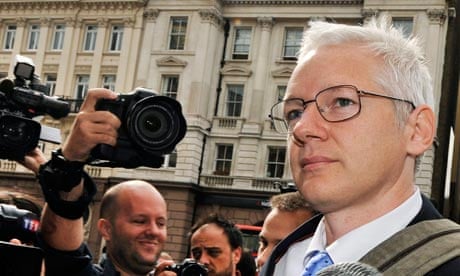He arrived in silence and was told by his lawyer to leave in silence. In between he was humbled. Julian Assange, the controversial founder of WikiLeaks, appeared at the high court in London at the start of his latest fight against extradition to Sweden over sex allegations. He was armed with a new strategy and a new legal team aimed at winning his freedom after 216 days of house arrest.
On Sunday, he celebrated his 40th birthday at Ellingham Hall in Norfolk with "wiki cupcakes" and a party for 100 friends and supporters. But he was fighting an extradition request that he fears could pave the way to further extradition to America, and serious charges related to his leak of several hundred thousand classified US government documents.
The new approach demanded he fight his natural instinct to speak out, so he sealed his lips as he fought through a phalanx of photographers outside the Royal Courts of Justice. Once inside the vaulted and wood-lined courtroom four where he faced Lord Justice Thomas and Mr Justice Ouseley, his new tactics became clear. In essence, his lawyers would admit, his sexual behaviour with two Swedish women he had met while on work in Stockholm last August might have been seen as "disrespectful, discourteous, disturbing" but it was not illegal.
His failed appeal against the same extradition order in February had been marked by grandstanding speeches and a combative legal approach that tore into the Swedish authorities who wanted him to face questioning over four allegations of unlawful coercion, sexual molestation and rape. Assange's side had also claimed there was no chance of a fair trial in Sweden because of the political heat around the case after WikiLeaks released hundreds of thousands of classified US government documents in 2010.
His new legal team advanced none of these arguments, and his counsel, Ben Emmerson, spelled out the difference in approach. He told the court: "Nothing I say should be taken as denigrating the complainants, the genuineness of their feelings of regret, to trivialise their experience or to challenge whether they felt Assange's conduct was disrespectful, discourteous, disturbing or even pushing at the boundaries of what they felt comfortable with." He then laid out their evidence against his client with relentless and clinical frankness.
Referring to evidence of an encounter on the night of 13 August given by a woman known as AA who was putting Assange up at her apartment, Emmerson said: "The appellant's physical advances were initially welcomed but then it felt awkward since he was 'rough and impatient' ... AA was lying on her back and Assange was on top of her ... AA felt that Assange wanted to insert his penis into her vagina directly, which she did not want since he was not wearing a condom ... she did not articulate this. Instead she therefore tried to turn her hips and squeeze her legs together in order to avoid a penetration ...
"AA tried several times to reach for a condom which Assange had stopped her from doing by holding her arms and bending her legs open and try to penetrate her with his penis without using a condom. AA says that she felt about to cry since she was held down and could not reach a condom and felt this could end badly."
Assange, sitting among supporters including John Pilger, the campaigning investigative journalist, and Vaughan Smith, the owner of Ellingham Hall and founder of the Frontline Club for journalists, showed no emotion as these and other highly graphic personal details were recounted. Emmerson explained how "on one occasion he suddenly took all his clothes off on the lower part of his body and rubbed it and his erected penis against AA. AA says she felt it was very strange behaviour and awkward".
However, Assange's case against extradition does not hinge on whether he accepts these versions of events and testimonies relating to other incidents because there are no charges against him, the court heard. Rather Emmerson said it was a question of whether the arrest warrant in connection with the allegations is valid on "strict and narrow" legal grounds.
He said it was not because there are significant discrepancies between the allegations of sexual assault and rape in the European arrest warrant and the testimonies of two women.
The warrant was a misinterpretation of the evidence and it was "surprising and disturbing" that Swedish district judges who requested Assange's extradition had been misled, he said.
Emmerson told the court that there was no evidence that there was a lack of consent in the encounters, as suggested in the warrant, and that three of the allegations would not amount to criminal offences under English law.
Referring to the allegations in the warrant, Emmerson said: "The senior district judge found that those factual allegations would establish dual criminality on the basis that lack of consent, and lack of reasonable belief in consent, may properly be inferred from the conduct described, particularly the references to 'violence' and a 'design' to 'violate sexual integrity'. However, that description of conduct is not accurate. The arrest warrant misstates the conduct and is, by that reason alone an invalid warrant."
Mark Summers, also acting for Assange, said the European arrest warrant was not valid for several other technical reasons: under UK law it cannot be used to secure pre-prosecution interviews; Swedish prosecutors have not yet decided to press charges, and he could be interviewed by phone or Skype.
The case continues.
